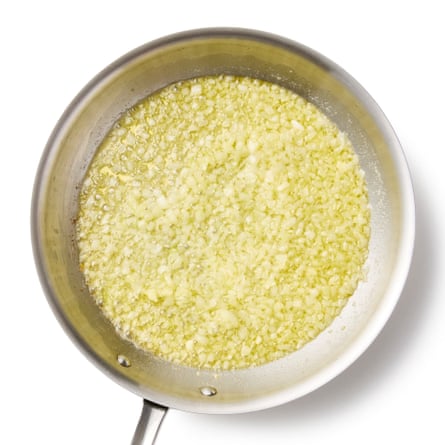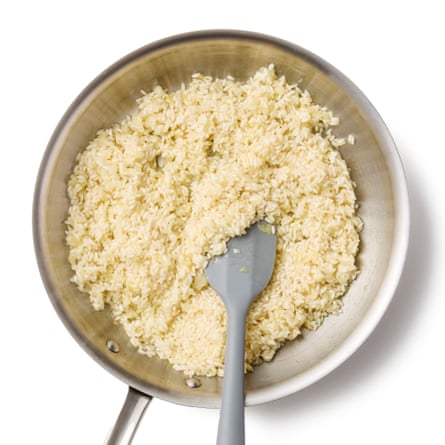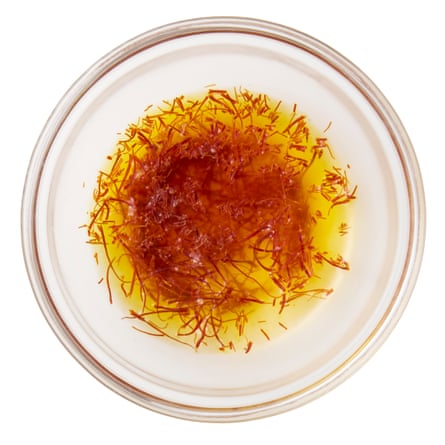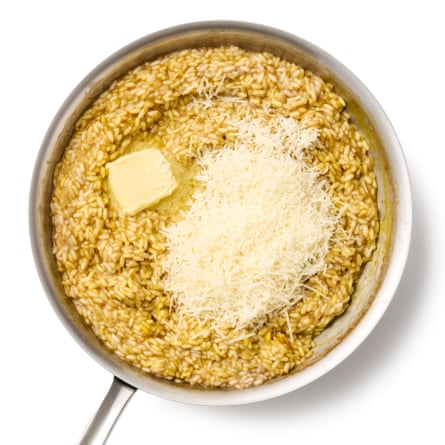Risotto alla milanese is, like the city it calls home, elegantly simple, but very rich. The saffron that gives the dish its striking colour is rightly expensive (it takes about 150 flowers to produce a mere gram), but you don’t need much and, though it’s often served alongside osso buco, I think it makes a fine meal on its own with a bitter-leaf salad.
Prep 5 min
Cook 30 min
Serves 4
1 onion
75g butter, or 15g butter plus 60g bone marrow
350g risotto rice (carnaroli, arborio, vialone nano)
1 litre beef stock, or chicken or vegetable stock
75ml dry white wine (see step 4)
1 level tsp saffron threads
75g finely grated parmesan, or grana padano or a vegetarian alternative
1 Chop the onion very finely
Peel and finely chop the onion; the aim is for it almost to disappear into the dish, rather than remaining as distinct chunks, so take your time over doing this (you could substitute two shallots, if you prefer – their sweetness works particularly well with the flavour of the wine and cheese).
2 Soften the onion

Melt a generous tablespoon of the butter in a frying pan set over a medium-low heat, then fry the chopped onion until soft, golden and limp, but not coloured.
Turn the heat up to medium-high, add the rice and fry, stirring constantly, until the grains are hot and starting to turn translucent around their edges.

3 A note on the stock
Meanwhile, bring the stock to a gentle simmer on the hob. Beef is the traditional choice with osso buco, but you may prefer to use a chicken or vegetable-based example, or simply water down the beef stock for a slightly lighter dish. Conversely, for a beefier result, substitute some of the butter with bone marrow from the butchers.
4 Add the wine
Once most of the rice grains are semi-translucent, pour in the wine (it should hiss when it hits the pan) and leave to bubble away until it’s almost all evaporated. You could also use dry vermouth or sherry here, if that’s what you have to hand, or indeed leave out the alcohol altogether, as many local Milanese recipes do.
5 Start adding stock bit by bit

Stir in a ladleful of hot stock, then leave to cook until it’s all been absorbed (there’s no need to stir at this point). While you wait for that, lightly crush most of the saffron threads in a mortar (keep a few back to use as a garnish later), then pour in a little of the hot stock and leave to steep and infuse.

6 Keep adding stock
Keep adding ladlefuls of hot stock for about eight minutes, waiting until each one is absorbed before adding the next, and begin stirring the rice as you do so. Keep going until the rice is just a little al dente for your taste; classically, it should still have some bite in the centre, but that’s up to you. If you run out of stock, switch to hot water.
7 Flavour with the steeped saffron

Stir in the saffron-infused stock. Risotto should have a loose texture that’s more like porridge or a loose rice pudding than anything capable of holding its own shape; if yours feels a little on the stodgy side, stir in a little more stock or water as your taste dictates (try it before deciding, though, because you might find it rich enough as it is).
8 Add butter and cheese

Add the remaining butter or bone marrow to the risotto, along with the grated cheese; grana padano is the local option. Cover and leave to sit for a couple of minutes, then vigorously beat the risotto until it turns creamy. Season to taste (you may well not need any more salt), garnish with the reserved saffron and serve at once in hot shallow bowls.
9 A note on getting ahead
Alternatively, to get ahead, after the first eight minutes of cooking the rice in stock, spread out the rice in a single layer on a large baking tray. Leave it to cool, then transfer to a suitable container, cover and chill. When you’re ready to eat, simply return the rice to the pan, heat both it and the stock back up and continue with the recipe as written.

.png) 3 months ago
58
3 months ago
58

















































